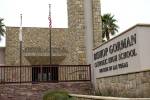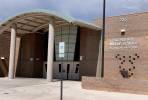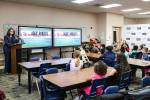West Las Vegas school plan blasted
A plan to help improve West Las Vegas schools was met with rancor late Thursday as about 40 residents of the historically black neighborhood told the Clark County School Board the plan is too little, too late and patronizing in its lack of community input.
"What you're seeing tonight is anger from a community that has been left out of the decision-making as it relates to the education of young people," Robert L. Green told the board. "Part of it is paranoia, but part of it is real paranoia."
Another speaker, Dell Ray Rhodes, described the district's attitude as "We made up the menu, but you can look it over."
Superintendent Walt Rulffes, appearing at his last meeting before retirement, responded that the plan was not intended as the final word but more as a "point of departure." The district will organize town hall meetings in West Las Vegas, which is generally defined as bordered by Interstate 15 to the east, Rancho Drive to the west, Bonanza Road to the south and Carey Avenue to the north.
Frank Hawkins, the president of the Las Vegas NAACP and a member of the district's Bond Oversight Committee, noted the plan omits any mention of West Prep Academy even though it's located in the middle of West Las Vegas near Martin Luther King and Lake Mead boulevards.
Residents have been demanding a major facilities upgrade to replace the school's 54 portable classrooms. They were installed five years ago when West Prep converted from a middle school to a K-12 campus.
Hawkins also lambasted district staff for dithering in response to a 2009 study by researchers from the Civil Rights Project at the University of California, Los Angeles. The report was written in an urgent tone as it described students at Carson, Fitzgerald, Matt Kelly, Booker, Wendell Williams and McCall elementary schools as becoming increasingly isolated by the triple segregation of race, poverty and language barriers. The historically black neighborhood has a growing Hispanic population.
The UCLA researchers also noted significant gaps in student achievement by ethnic group, and that West Las Vegas students were more likely to have inexperienced teachers.
Rulffes then formed a citizens advisory committee but gave it a broader mission of looking at under-performing schools in high poverty areas across Clark County, not just West Las Vegas.
Dale Erquiaga, the school district's liaison to that committee, left the district in October and is now a senior adviser to governor-elect Brian Sandoval. The district is now in transition, with Rulffes retiring and Board President Terri Janison leaving to work for the new governor.
District officials said suggestions from the committee were used to develop the West Las Vegas plan, which calls for developing more attractive academic programs, such as an International Baccalaureate magnet program at Carson Elementary School.
West Las Vegas schools, on average, have better funding than others because they qualify for extra federal money for high-poverty schools, and for district spending on desegregation efforts. The district, for example, spent $13,576 per student at Matt Kelly compared to the district-wide average of $8,246 per student in 2008-09.
Under the proposed plan, West Las Vegas students will also continue to get transportation to attend schools outside their regular attendance zones, though options are being reduced from 41 schools to 17. The reduction is aimed at easing the district's cost of transportation .
Marzette Lewis complained that these 17 schools are probably as "raggedy" as the schools in West Las Vegas. "I guarantee it," she said.
The "17 option schools" are Adcock, Antonello, Bruner, Crestwood, Decker, Fyfe, Gray, Hancock, Kim, McMillan, Mountain View, Pittman, Red Rock, Ronzone, Helen M. Smith, Tobler and Ullom elementary schools.
Contact reporter James Haug at jhaug@reviewjournal .com or 702-374-7917.























